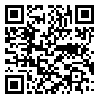Volume 5, Issue 15 (6-2015)
2015, 5(15): 1-11 |
Back to browse issues page
Download citation:
BibTeX | RIS | EndNote | Medlars | ProCite | Reference Manager | RefWorks
Send citation to:



BibTeX | RIS | EndNote | Medlars | ProCite | Reference Manager | RefWorks
Send citation to:
Rezaee R, Hasani D, Vahdati K. Determination and Evaluation of the Best Top Working Method for Inferior Walnut Trees in West Azerbaijan . Journal of Crop Production and Processing 2015; 5 (15) :1-11
URL: http://jcpp.iut.ac.ir/article-1-2318-en.html
URL: http://jcpp.iut.ac.ir/article-1-2318-en.html
, Agricultural and Natural Resources Research Center, West Azarbaijan, Urmia. , rezrezaee@yahoo.com
Abstract: (7682 Views)
To determine a suitable method and time of top-working for inferior walnut trees, a preliminary study was conducted to compare nine different grafting or budding methods. Two promising methods including modified bark grafting and cleft grafting at two times (early April and mid April) were further evaluated during 2001- 2006, in terms of grafting percentage and subsequent impact on growth and fruiting using a completely randomized block design. The modified bark grafting on main branches in the mid April showed the highest grafting success and survival percentage (76 - 93%). The number of nut, kernel color and weight was increased significantly in the top worked shoots compared to the non-top worked shoots (p<0.01). Using modified bark grafting method, 15 local walnut genotypes were successfully top worked in a collection in 2004. The bark grafting method was also evaluated under different orchard conditions in west Azarbaijan during 2008-2009. Grafting success varied between 30 - 100% (averaged 67.7%), indicating the higher capability of this method for top working of walnut trees. Therefore, the modified bark grafting method on main branches in the second half of April could be recommended for walnut top working, especially in young, newly established seedling orchards.
Send email to the article author
| Rights and permissions | |
 | This work is licensed under a Creative Commons Attribution-NonCommercial 4.0 International License. |







